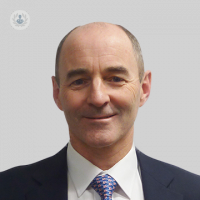Can tinnitus go away by itself?
Escrito por:Leading consultant ENT surgeon, Mr Michael Pringle, provides an expert insight into tinnitus, a symptom characterised by regular whooshing sounds or the continuous sound of a seashell in the ear. The specialist also explains whether the symptom can disappear by itself and what could be a possible cause.

What is tinnitus?
The simplest definition of tinnitus is ‘an auditory sensation (hearing a noise) without any external stimulus’. It is a noise that generally only the person hearing it can hear. Occasionally, in pulsatile tinnitus or clicking tinnitus, other people may be able to hear the noise, but this is rare.
The noise can be whistling, rumbling, whooshing, musical, like a seashell or really any other type of sound. It can be continuous or intermittent, and can fluctuate in intensity. In a completely soundproofed room, 90 per cent of us will experience very quiet tinnitus.
Do we know what causes tinnitus?
The vast majority of the time we do not know the exact cause of the tinnitus. It is more common with increasing age and is often associated with hearing loss. The presumption is that whatever has caused the hearing loss has affected the normal hearing pathways and the resulting damage is creating activity in the hearing nerves which the brain perceives as tinnitus.
In some people, the cause of the tinnitus can be identified, and rarely it may indicate a serious underlying condition. There are many possible causes of tinnitus ranging from simple wax blockage to noise exposure, a variety of ear disorders, a tumour near the ear (acoustic neuroma, gloms tumour) or other non-ear conditions.
READ MORE: OTHER CAUSES OF TINNITUS
How is tinnitus diagnosed?
Tinnitus is a symptom, not a disease. It can not be recorded or measured; only the patient can say if they have it or not.
The next step is to look for a cause. This involves a thorough medical history, an ear, nose and throat examination, hearing tests, possibly a scan, and rarely blood tests. The type and duration of the tinnitus, and the presence of other associated symptoms, will determine the degree of assessment required and whether or not the GP should refer the patient to a specialist.
Can tinnitus go away?
Yes. Sometimes, treatment of an underlying cause will resolve tinnitus. Sometimes, tinnitus will go away by itself. Sometimes, tinnitus will not go away but with advice and appropriate management, it will usually become non-troublesome.
How is tinnitus treated?
After a full assessment, if required, there are a variety of options to help. First, treat any possible identified causes. It is then very important that you have a full understanding of what tinnitus is and its significance in your particular case, and understand that in the vast majority of cases, it does not represent any underlying sinister problem and can usually be helped with the appropriate management.
Management strategies include a full explanation, hearing aids if required, noise protection, tinnitus maskers, sound generators, relaxation techniques such as mindfulness, and tinnitus counselling. With time, the vast majority of people will ‘habituate’ to the tinnitus - in other words, not be troubled by it and not really notice it unless you tune in to listen to it. This is true of many noises going on all the time in the environment around us which the brain just ignores.
If you are concerned about tinnitus, don't hesitate to book an appointment with Mr Michael Pringle via his Top Doctors profile today.


